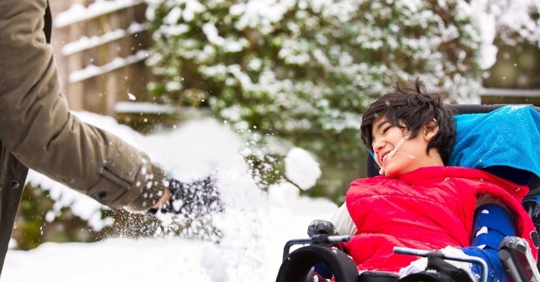Seasonal Attire for Children with Disabilities
Every parent with a special needs child has gone through the stress of finding clothing best suited for their child's needs. From combing through aisles of itchy fabrics and complicated zippers to hours spent online looking at expensive options promising to accommodate the lifestyle of these children, it can be a costly and time-consuming process. And unfortunately, putting on a standard winter coat may not always be that simple for certain families.
Fortunately, adaptive clothing is becoming much more widespread, and a variety of options designed for winter wear are more easily accessible in stores worldwide. Here are five things you need to know about finding the perfect adaptive clothing for your child this season.
1. What is Adaptive Clothing?
Unlike the "standard" options, adaptive clothing is designed to accommodate individuals with special needs. This can be done through a mix of sensory-friendly fabrics and patterns, as well as using closures that can make putting on and taking off garments easier. For example, they may feature:
- Velcro, snaps, or magnets instead of buttons
- Open-back shirts to allow for tubes, pumps, and wires
- Zippers down the side of pants
- Larger zippers or rope ties
- Velcro or magnetic shoe fasteners
- Slip-on/stretchy boots and shoes
- Shoes that open wider as to not strain when putting them on
- Pant cuts that allow for more comfortable wheelchair sitting
2. Where Can You Buy Adaptive Clothing?
Many major retailers like Target, Kohl's, and JC Penney are becoming more accessible to individuals with special needs and have begun carrying a variety of adaptive clothing options. Additionally, small sellers through Etsy or even popular designers like Tommy Hilfiger sell inclusive clothing options.
“Tommy Hilfiger Adaptive,” for example, includes styles with sensory-friendly and stretchable fabrics, one-handed zippers, and styles for wheelchair riders and those who have prosthetics. The company went further to partner with the Special Olympics for the 2018 USA Games.
3. Adaptive Clothing & Inclement Weather
A new wave in the adaptive clothing industry is finding ways to make items functional in wintery conditions. From developing ski suits designed for those with disabilities to creating a fabric that can aid in regulating body temperature, there are many cold weather options in the testing and production phases. Snow boots and whole-hand gloves/mittens are also becoming mainstays in winter collections, and electric vests are becoming more popular in recent years.
4. Ensuring Head-to-Toe Protection
It's important to note that adaptive clothing can be for more than just putting together an outfit. Certain items may also provide safety against falls, aid in your child's reaction to colder weather, and help those with sensory issues. For example, companies like Crasche have designed impact-resistant hats that look like the standard winter beanie, and many companies have mittens that cover the whole hand instead of separating the thumb from fingers.
5. What Other Accommodations Can Be Made?
When thinking of ways to help your child adapt to the winter weather, you may also want to consider additional accommodations that can be made outside of clothing. In areas where snowfall is expected, don't forget to swap out wheelchair tires for those with better traction or designed to be used in all kinds of weather conditions. If you are also planning to go somewhere with a ramp, call ahead to ensure that it is cleaned off before arriving.
Maryland Birth Injury Attorneys
Helping your child ease into the colder weather should be the last thing you have to worry about this season, and you have many resources available to you should you need necessary accommodations.
The Law Firm of Michael H. Bereston, Inc. has dedicated our practice to advocating for families who have suffered harm from birth injuries. We believe in standing up for injured children and are prepared to help ensure your rights are protected. If you or a loved one suffered from a birth injury and are looking for legal assistance, contact our office today by calling (410) 220-6581 or filling out this short form.

